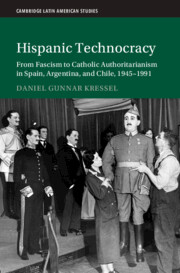Refine search
Actions for selected content:
481 results
3 - Liberalism(s) and International Security
- from Part I - Security in Theory
-
- Book:
- Understanding International Security
- Published online:
- 11 October 2025
- Print publication:
- 30 October 2025, pp 40-59
-
- Chapter
- Export citation
Policy Reform After Structural Adjustment in Zambia: The Politics of Restoring a Statist Development Agenda, 2011–2014
-
- Journal:
- African Studies Review , First View
- Published online by Cambridge University Press:
- 15 October 2025, pp. 1-22
-
- Article
-
- You have access
- Open access
- HTML
- Export citation
Private Property Rights in Company Ownership in Nigeria: Neoliberal Policies and Structural Injustice
-
- Journal:
- Journal of African Law , First View
- Published online by Cambridge University Press:
- 10 October 2025, pp. 1-20
-
- Article
-
- You have access
- Open access
- HTML
- Export citation
Resilience and transnational financial regulation: proceed with caution
-
- Journal:
- International Journal of Law in Context , First View
- Published online by Cambridge University Press:
- 10 October 2025, pp. 1-20
-
- Article
-
- You have access
- Open access
- HTML
- Export citation
Cultural Autonomy, Zeitgeist and Simulation Politics: Russia as a Specimen
-
- Journal:
- Nationalities Papers , FirstView
- Published online by Cambridge University Press:
- 22 September 2025, pp. 1-19
-
- Article
-
- You have access
- Open access
- HTML
- Export citation
3 - Christian Democratic Solidarity
-
- Book:
- Latin America and Human Rights Politics in West Germany, 1973–1990
- Published online:
- 18 October 2025
- Print publication:
- 18 September 2025, pp 112-144
-
- Chapter
- Export citation
Epilogue
-
- Book:
- Latin America and Human Rights Politics in West Germany, 1973–1990
- Published online:
- 18 October 2025
- Print publication:
- 18 September 2025, pp 305-322
-
- Chapter
- Export citation
Chapter 1 - Introduction
-
-
- Book:
- Questioning Conventional Assumptions of Competition Dynamics
- Published online:
- 07 May 2025
- Print publication:
- 21 August 2025, pp 1-15
-
- Chapter
- Export citation
Chapter 1 - The Politics of Postmodern British Fiction
-
-
- Book:
- The Cambridge Companion to British Postmodern Fiction
- Published online:
- 07 August 2025
- Print publication:
- 21 August 2025, pp 18-32
-
- Chapter
- Export citation
4 - Augusto Pinochet’s Dictatorship
-
- Book:
- Hispanic Technocracy
- Published online:
- 07 August 2025
- Print publication:
- 14 August 2025, pp 103-134
-
- Chapter
- Export citation

Hispanic Technocracy
- From Fascism to Catholic Authoritarianism in Spain, Argentina, and Chile, 1945–1991
-
- Published online:
- 07 August 2025
- Print publication:
- 14 August 2025
Chapter 22 - Free Money? Literature, Liberty, and Alternative Currencies
- from Part III - Alternatives
-
-
- Book:
- Money and American Literature
- Published online:
- 03 July 2025
- Print publication:
- 17 July 2025, pp 381-398
-
- Chapter
- Export citation
Chapter 17 - Imagining and Occupying Wall Street
- from Part II - Histories
-
-
- Book:
- Money and American Literature
- Published online:
- 03 July 2025
- Print publication:
- 17 July 2025, pp 293-310
-
- Chapter
- Export citation
4 - Protestantism and Catholicism in German Postwar Reconstruction
-
- Book:
- How Economic Ideas Evolve
- Published online:
- 06 June 2025
- Print publication:
- 10 July 2025, pp 96-128
-
- Chapter
- Export citation
The Translation Machine: Exploring the Infrastructures of Valorization under Semiocapitalism
-
- Journal:
- Signs and Society / Volume 13 / Issue 3 / September 2025
- Published online by Cambridge University Press:
- 08 July 2025, pp. 311-325
-
- Article
-
- You have access
- Open access
- HTML
- Export citation
4 - Dilemmas of Success
-
- Book:
- After Equality
- Published online:
- 19 June 2025
- Print publication:
- 03 July 2025, pp 119-148
-
- Chapter
- Export citation
Chapter 1 - Periodizing the Contemporary
- from Part I - Shifting Coordinates
-
-
- Book:
- Latinx Literature in Transition, 1992–2020
- Published online:
- 19 June 2025
- Print publication:
- 03 July 2025, pp 25-42
-
- Chapter
- Export citation
6 - Draft Capital
-
- Book:
- Gift and Grit
- Published online:
- 26 May 2025
- Print publication:
- 12 June 2025, pp 182-211
-
- Chapter
- Export citation
2 - The Subtle Influence of Ideas
- from Part I - Defining the Policy Problem
-
- Book:
- Balancing Pressures
- Published online:
- 02 May 2025
- Print publication:
- 22 May 2025, pp 25-42
-
- Chapter
- Export citation
Constitutional Rights of Corporations in the United States and the European Union: A Comparative Political Economy Perspective
-
- Journal:
- German Law Journal ,
- Published online by Cambridge University Press:
- 16 May 2025, pp. 1-19
-
- Article
-
- You have access
- Open access
- HTML
- Export citation
